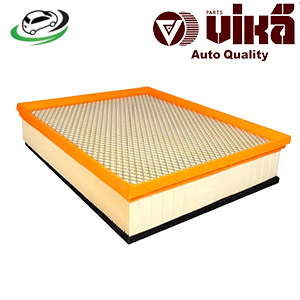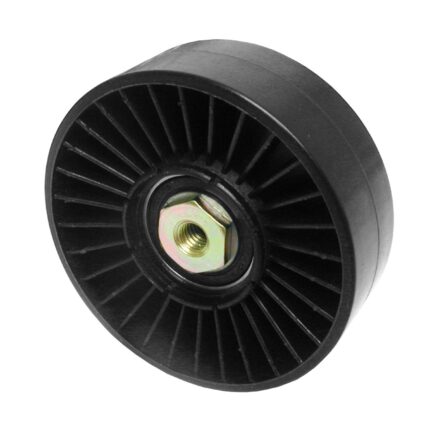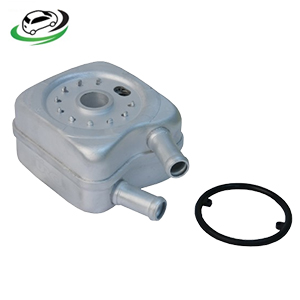-8%
Get Engine Oil Cooler AUDI B5 A4/B6 A4/TT MKI / VW 337/20AE/Golf IV/Jetta IV GLI/Jetta IV/Passat B5/New Beetle 028117021L
The engine oil cooler is a vital component in a vehicle’s engine cooling system. It helps maintain the engine oil at an optimal temperature, ensuring efficient lubrication and preventing overheating. Understanding the structure, function, types, benefits, common issues, and maintenance of engine oil coolers is crucial for ensuring optimal engine performance and longevity.
Structure and Function of Engine Oil Coolers
The engine oil cooler functions by dissipating heat from the engine oil, ensuring it remains at an optimal temperature for effective lubrication.
Components of an Engine Oil Cooler
- Cooling Fins: These increase the surface area for heat dissipation.
- Oil Passages: Channels through which the engine oil flows, allowing heat exchange with the cooling fins.
- Inlet and Outlet Ports: Points where oil enters and exits the cooler.
- Mounting Brackets: These secure the cooler in place within the engine bay.
Function in the Engine System
The primary functions of the engine oil cooler are to:
- Dissipate Heat: As engine oil circulates through the cooler, heat is transferred from the oil to the cooling fins and then to the surrounding air.
- Maintain Optimal Oil Temperature: By regulating oil temperature, the cooler ensures that the oil remains within the ideal viscosity range for effective lubrication.
- Prevent Overheating: By reducing the temperature of the engine oil, the cooler helps prevent engine overheating, which can lead to severe damage.
Types of Engine Oil Coolers
Engine oil coolers come in various types, each designed to suit different vehicle models and performance requirements.
Air-Cooled Oil Coolers
Air-cooled oil coolers rely on airflow to dissipate heat. These coolers are typically mounted in front of the radiator or in areas with good airflow. They are common in high-performance and heavy-duty vehicles.
Water-Cooled Oil Coolers
Water-cooled oil coolers use engine coolant to remove heat from the oil. These coolers are integrated into the engine’s cooling system, making them compact and efficient. They are commonly used in modern vehicles for their effectiveness and space-saving design.
Plate and Fin Oil Coolers
Plate and fin oil coolers consist of a series of thin plates stacked together, with oil flowing between them. These coolers offer high efficiency and compact size, making them suitable for various applications.
Tube and Fin Oil Coolers
Tube and fin oil coolers have a series of tubes through which oil flows, surrounded by cooling fins. This design provides a large surface area for heat dissipation and is commonly used in performance vehicles.
Benefits of Engine Oil Coolers
Engine oil coolers offer numerous benefits that enhance engine performance, reliability, and longevity.
Improved Engine Performance
By maintaining optimal oil temperature, oil coolers ensure that the engine operates efficiently. Properly cooled oil reduces friction and wear, resulting in better performance and fuel efficiency.
Enhanced Engine Longevity
Consistently high oil temperatures can cause oil breakdown and lead to increased engine wear. Oil coolers help prevent this by maintaining the oil at a safe temperature, extending the engine’s lifespan.
Reduced Risk of Overheating
Oil coolers play a crucial role in preventing engine overheating, especially during heavy use or in high-temperature environments. This reduces the risk of engine damage and failure.
Better Lubrication
Optimal oil temperature ensures that the oil maintains its viscosity, providing effective lubrication to engine components. This reduces friction and wear, leading to smoother engine operation.
Common Issues and Maintenance of Engine Oil Coolers
Despite their durability, engine oil coolers can experience wear and tear over time. Regular inspection and maintenance are crucial for ensuring their proper function.
Signs of a Faulty Oil Cooler
- Oil Leaks: Visible oil leaks around the cooler or oil lines can indicate damage or wear.
- Overheating Engine: An overheating engine may suggest that the oil cooler is not functioning correctly.
- Contaminated Oil: Oil that appears dirty or contains metal shavings can indicate a problem with the oil cooler.
- Decreased Performance: Reduced engine performance and efficiency can be signs of inadequate oil cooling.
Maintenance Tips
- Regular Inspection: Periodically inspect the oil cooler and connections for signs of wear, damage, or leaks.
- Cleanliness: Keep the cooler and surrounding area clean to ensure proper airflow and cooling efficiency.
- Timely Replacement: Replace a damaged or worn oil cooler promptly to prevent further engine damage.
- Use Quality Parts: Use high-quality replacement parts that match the specifications of your vehicle for optimal performance and durability.
Advances in Oil Cooler Technology
Modern advancements in oil cooler technology have led to improved performance, durability, and ease of maintenance.
Advanced Materials
The use of advanced materials, such as aluminum and high-strength composites, enhances the durability and heat dissipation properties of oil coolers. These materials are designed to withstand the stresses of modern driving conditions.
Precision Engineering
Improved manufacturing techniques, such as CNC machining and precision welding, ensure that oil coolers meet high standards of quality and consistency. This precision results in better performance and reliability.
Enhanced Designs
Innovative designs, such as integrated cooling fins and optimized oil flow paths, provide greater efficiency and performance for modern engines. These designs improve the overall effectiveness of the oil cooler in protecting the engine.
Follow us on Facebook for more parts.



